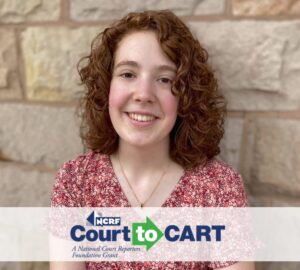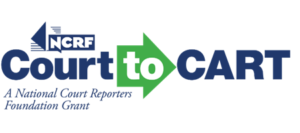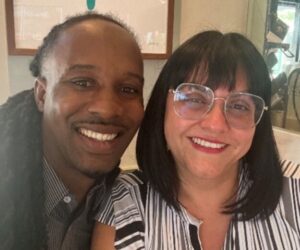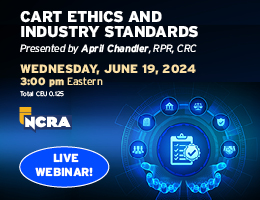By Chris DeGrazio
Thomas Herman, a CART captioner from Miami, Fla., is passionate about equal access and inclusion. “A society can only grow and improve by including all people in the fold,” he says.
JCR | How did you get interested in stenography?
TH | A friend/colleague at that time was finishing her exit speeds in school and would talk about her steno studies. Since I’m a self-proclaimed nerd and love English and writing and was looking for a career change back then, the steno bug bit me!
JCR | Who or what inspires you?
TH | My spouse, Christopher, inspires me. He has a passion for travel and the arts and really has taught me to enjoy life and be thankful for every day. He works to live, not lives to work. Sage advice for a lot of overworked professionals in general, but especially stenographers. Some of us could probably learn more life-work balance for sure.
JCR | What do you enjoy most about captioning?
TH | The thing I enjoy most about CART captioning is the sense of purpose. I’m helping folks get equal access to live events, workplace meetings, college lectures, workshops, expos, doctor appointments, IEP meetings, therapy sessions, workplace training, and more.
A society can only grow and improve by including all people in the fold. Captioning for folks who otherwise may not be included fully at events is pretty cool. Also, it’s taught me so much. Listening to experts in fields I’d otherwise not be exposed to, I’m always learning, hearing a new point of view, hearing a new lived experience, learning scientific or historical information, celebrity speakers. I feel humbled every day.
JCR | How did you feel both going into your first assignment as a captioner and coming out of it?
TH | Horrified — and happy. That’s real talk. I definitely suffer from imposter syndrome to this day. In my opinion, that’s a mental health concern we should talk about more within the industry, and we should create more support for steno folks getting into realtime services. But despite passing in-house testing and being assigned an “easy” client, I was so nervous and sweating on my writer. I knew someone needed me to show up and caption well for them. I was not feeling confident or comfortable at all; but as soon as the client arrived, that part of my brain making it about me, my skills, my worth, turned off and I went on caption mode. I had a job to do, and I did it well despite my nerves. I ended up doing a lot of recurring captioning for that client.
JCR | If you could sum up your first year in one word, what would it be and why?
TH | I’m not a first-year captioner, full disclosure, but if I had to sum up my first year in a single word, it would be “blessed.” The first year of working was nothing short of a blessing. It was a blessing to be out of school. It was validation that school was worth it. It was a financial blessing that provided great flexibility. It was security I’d never felt in the workplace before. #blessed
JCR | What do you know now that you wish you’d known when you first started out?
TH | I wish someone spoke to me more about being aware of workplace culture, of knowing my worth, to be blunt, and setting boundaries. I’ve heard stories from Black friends of firms commenting on their natural hair — that was prior to the Crown Act — and of female court reporters being objectified by male attorneys on occasion. I’ve experienced homophobia and all of us thinking this is just how it is. If we’re wanting to get work, you have to smile through things. I’m not an easily offended person at all, and I still smile through things and give people grace who may have a different lived experience from my own. But I now also set boundaries when needed or opt not to take work from certain organizations whose values don’t reflect my own. That doesn’t only mean identifying a certain way. It could be just finding a respectful office staff, a place with snacks, a place that offers some medical insurance buy-in, whatever makes you feel welcomed.
In hindsight, I realize firms and agencies need us as much as we need them, and that every court reporter and captioner has a right to vet who they’re working with and/or make sure it’s an organization that will honor you and treat you with dignity. You can also draft your own agreement with firms. We’re usually independent contractors, not employees, and we can negotiate our terms and rates rather than just blindly signing a firm’s generic agreement. I will say most experiences have been amazing to be clear, but, yeah, there is enough work to be had. Find a network that, not only provides work, but treats you in a way that aligns with your authentic self.
JCR | What is your biggest challenge as a new captioner?
TH | For me it is doing CART. It was learning how to prepare for jobs and what entries to put in what dictionary. Luckily, my mentors helped me navigate that, and most speakers are open to sharing slide decks or a syllabus or an agenda to pull data from so you familiarize yourself with proper nouns and new terms. You can brief things ahead of time.
JCR | What’s the coolest experience you have had working in the profession?
TH | I’ve got so many that could be a whole separate article. I’m a big tennis fan, so maybe captioning the GOAT Serena Williams and her husband, Reddit founder Alexis Ohanian, is high on the list. I also have been blessed to caption two amazing disability advocates. [One was] the recently passed Judith Heumann, the undisputed mother of the modern disability movement. I also captioned activist writer-editor Alice Wong, and let me tell you, she’s got a lot of wisdom everyone should listen to.
I captioned “An Ode to Spot,” a poem from Star Trek: The Next Generation, when Gord Roberts, who is a famous face in the content strategy field, recited it for a talent show segment at a conference one year. I’m a huge science fiction fan, so that was epic. Captioning Selena Gomez remotely from the set of Only Murders in the Building speaking about mental health was really cool. Captioning civil rights legend Dr. Reverend Leroy Haynes was also epic. I captioned Sasha Velour and Peppermint, both featured on Ru Paul’s Drag Race. They were quick-witted, and I worked hard to keep up with their energy! Actor Troy Kotsur, I captioned him via his interpreter voicing for him. It was so cool. He is so engaging and kind and he talked about working on Star Wars for Disney and talked about the then yet-to-be-released CODA film which later he made history with an Oscar win for his role in the film.
My coolest moment so far, though, was Olympic legend and soccer Hall of Fame member Abby Wambach doing a mic check with me and the AV folks before a Zoom event. And she was so chill and down-to-earth and was really fascinated with the steno machine. We probably chatted a bit longer than the organizers of the event would have liked, but who am I to not chat with a soccer GOAT and women’s rights advocate about my steno machine and accommodations and inclusion via captions? It was awesome.
JCR | What is your next goal?
TH | Humanizing captioners. We need to be seen and share what we do. I want to help the general public and the D/deaf and hard-of-hearing communities and others who utilize captions and also decision-makers understand that captioners do so much more than type fast. There are so many things that human cognition and human skills can provide for people who use captions.
JCR | What is a long-term goal?
TH | I’d love to grow my knowledge of the business side of things. I’d like to become a certified LBGTQ+-owned business. I’d like to start getting NCRA alphabet soup letters behind my name as well, meaning various certifications. I see folks doing it after working in the field for a minute, and I want to be like them.
JCR | What is the ultimate goal in your career?
TH | Thankfully, there’s a shift going on from just accommodating to being inclusive and welcoming to people with disabilities, and to the D/deaf and HOH communities as well. So many doors are opening up. I’d love to travel internationally. Let’s see the world! Maybe even caption from space, as various commercial space ventures are claiming space tourism will be a thing in my lifetime. I’d caption from space. Why not? Shoot for the stars.
Thomas Herman is a CART captioner in Miami, Fla. He can be reached at thomas@captionnerds.com.
Chris DeGrazio is a freelance reporter in Fort Pierce, Fla. He can be reached at sokhacambodian@yahoo.com.









